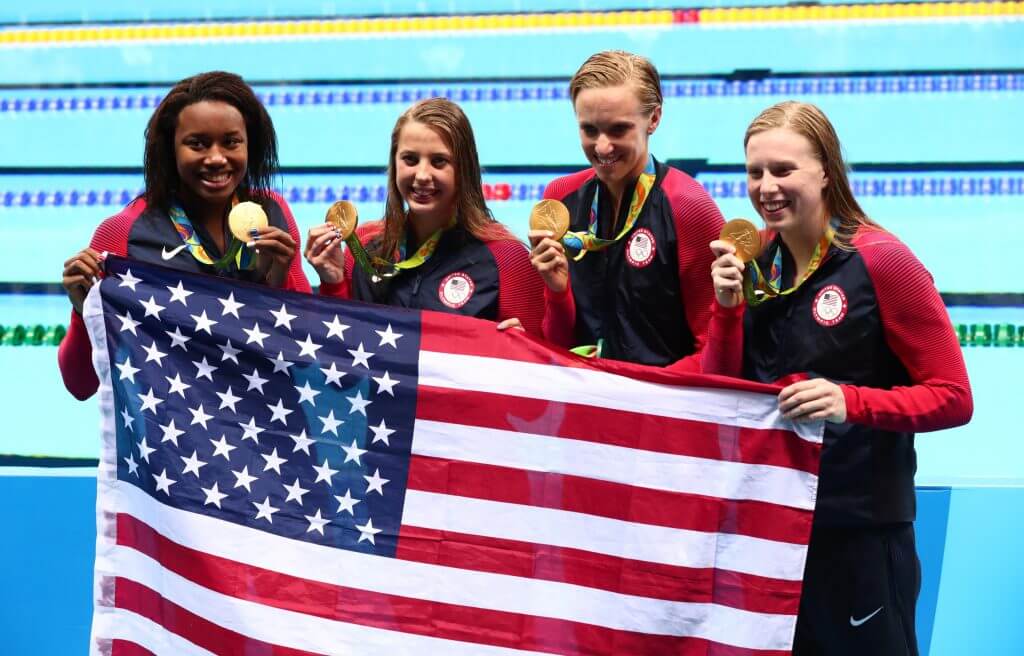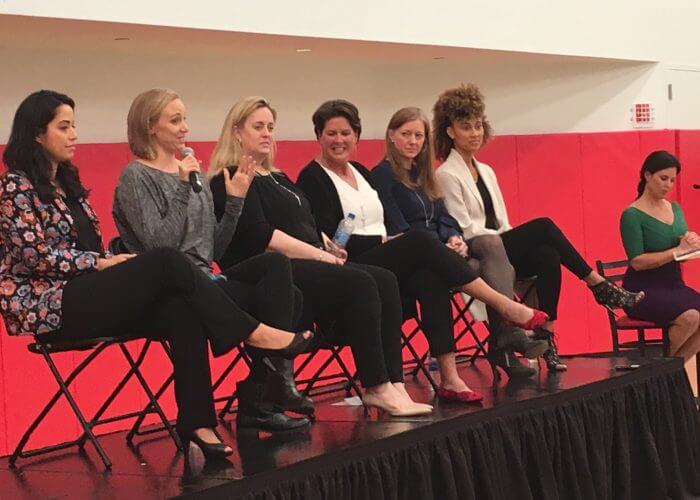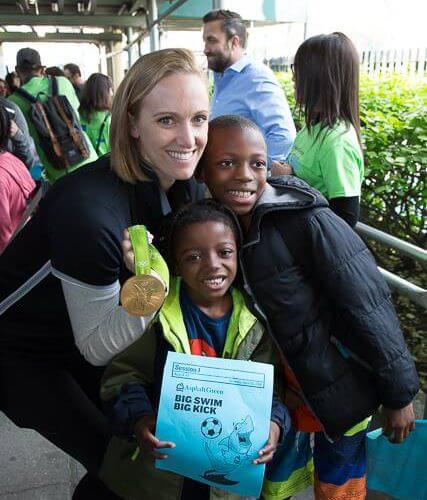Olympian Dana Vollmer Makes Lasting Impression at Women in Sports Discussion

By Michael Randazzo, Swimming World Contributor
In the era of #MeToo, where women are standing up to movie producers, politicians and the male establishment in general, a panel of impressive and accomplished women gathered last week at the all-girl Convent of the Sacred Heart School in New York City for a panel titled Women Empowered by Sports, part of Asphalt Green’s annual Big Swim Big Kick benefit.
Standing tall—literally and figuratively—was Dana Vollmer. Notable as one of the country’s most decorated female Olympians for her swimming exploits in the 2004, 2012 and 2016 Games, Vollmer was joined by Becky Burleigh, women’s head soccer coach at the University of Florida; New York City Council Member Carlina Rivera; Brooklyn Nets In-Arena host Ally Love; antitrust and sports attorney Karen Hoffman Lent; and Erin Shea, a Partner at Ernst & Young. The panel, moderated by WABC-TV meteorologist Amy Freeze, was held in front of approximately 150 adolescent and teen-age girls as well as many adults in Sacred Hearts’ immaculate gymnasium.
In a discussion broadly focused upon the impact of athletics on women’s lives, panelists recounted how their commitment to and passion for their respective sports brought them both joy and heartache. Vollmer struck a poignant note when she spoke of how being a 16-year-old Olympian was sometimes a lonely place. After winning gold in 2004 as a member of a world record-setting 4×200-meter freestyle relay, the Texas native recounted the now-familiar narrative of standing on the podium, listening to the Star-Spangled Banner and feeling a sweep of emotions as she looked to her parents in the audience.
If that was all there was to Vollmer’s story, perhaps it would be enough. But a razor-thin loss in the 2008 U.S. Olympic Trials led to a period of soul-searching and a renewed commitment to better preparing her body and mind for competition. Redemption came in 2012 when she swept to three golds and two world records at the London Olympics.
Perhaps most impressive was her performance at the 2016 Rio Olympics. 15 months after delivering her first child, Vollmer not only qualified for the U.S. Olympic swim team, she won a fifth gold in the 4×100-meter medley relay—along with a silver in the 4×100-meter freestyle relay and bronze in the 100-meter butterfly—boosting her Olympic medal total to a phenomenal seven. And she may not be done yet.
Following the panel discussion, Swimming World spoke with Vollmer about the pronounced differences of her Olympic experiences, pursuing her sport while making time for her sons and husband, Andy Grant, training with Milton Nelms, a world-renown swim coach, and how an Olympic-aspiring teenager grew up to be an inspiration to women all over the country.
– You spoke at the panel about how athletics helped with prioritizing what’s important.
Every single Olympics that I have been fortunate enough to go to has been completely different. To be 16 it felt like everything fell into place. I worked really hard and there were things that I overcame but I didn’t fully grasp what I had accomplished. To then train and to figure out why I wanted to keep swimming and what I wanted to do [next].

Vollmer (with microphone) at the Women Empowered by Sports panel in New York City
I went to Florida my freshman year [where I] struggled as a freshman. Then I went to Cal Berkeley and just missed the 2008 team, losing a race that was as close as 200ths of a second. I realized that everything I had worked for was slipping through my fingers. But it also made me appreciate how incredibly hard it is to make an Olympic team. It all comes down to Olympic trials and one single race.
Crumbling afterwards—I let pressure get to me—to come back and make that choice for myself [that] I still want to do this. No one was forcing me to; I wanted to keep doing this and I wanted to do this in a healthier way. I took on learning a lot about nutrition; I worked with a nutritionist for years and a new, healthier approach to my swimming. I’ve worked a lot with Milt Nelms, who now works with Asphalt Green.
Looking at the whole picture—all athletes need to do that—you have to be happy in so many areas in your life to have good performances.
– You get married, give birth to a son, and seemingly have moved into a new phase of your life. How did you end up being the first mother to win gold at the Olympics?
Honestly, I thought that was it. I went to 2012, I had three gold medals…every Olympic cycle there’s a limbo stage afterwards of: “What do you do with life?” Do you want to retire or do you want to go on to something you’ve never done before? Or do you want to keep training?
And I did decide to be done.
I didn’t actually retire, so part of me knew that I might swim. But, we made the decision to have a family, and then I wanted to get back in shape from a very organic, healthy place.
I only had 15 months so it took pressure off. Putting priority on being a mom and nursing and no sleep and everything that goes with that, and to see how well I can train.
I didn’t go as fast as I did in London, but I was still extremely happy being able to get back to where I was—and to get a gold, silver and bronze.
Now to be back in that same sort of limbo; it’s all about the choices and the priorities and how I structure my daily life that will make it possible for me to go to 2020.
As you get older, it’s not just about swimming—[I now have] two kids and my husband and time commitments and work—there’s a lot that plays into. Financial [considerations] definitely play into it.
There’s a whole handful of things that you have to work with. You have to be willing to make it look different than it has in the past. My training now is not going to look like a 16 year olds. It has to be different. Now I’m working on different ways that might look if I can train well enough to go to 2020.
– In between Olympics you’re not just sitting around watching reruns of “Friends.”
No, no [Laughs]! I’m definitely training now. It’s a little different. I’m doing a lot of dry land work—weights, trying to get stronger, I’ve been doing some running. A little bit of a step back from how much swimming I’m doing, just to give myself a break before re-focusing again.
I’m trying to take it easy so I don’t burn out before 2020.

Photo Courtesy: Jeffrey Valenzuela/Asphalt Green
– How challenging was it to go back to competitive athletics after having children?
It’s different. It was a lot of growth. A part that I think really helped my sport; [motherhood] broadens your perspective. It’s no longer all about making an Olympic team; it’s about these two little boys who are going to grow up and that’s way more important.
Swimming became my escape; it became when I got to go back and be playful and be with my teammates and push myself and see how fast I can go. And then go back to [my kids’ life] is what it felt like.
It took a lot of pressure off of the swimming. I found my home life was so much happier—fulfilling with swimming taking on a joyful part of my life.
– The audience was packed with young girls—many of whom were swimmers. How do you see your progression from precocious 16-year-old to Olympic role model and mom?
We learn so much in sport. The camaraderie and friendships and strength… it’s why I continue to train at Cal-Berkeley. Being surrounded by 24 motivated women—in academics, in sports—they have the same goal, and to surround yourself with people who want to excel is incredible.
When I think about leaving the sport, I’m really gonna miss that.
So it’s amazing to see these girls getting to be put in that environment and I hope that we emphasize the fun in the sport—learning that it’s not about success or failure, it’s about figuring out how you handle challenges, picking yourself back up. Those are the core messages of sport—not winning and losing.



